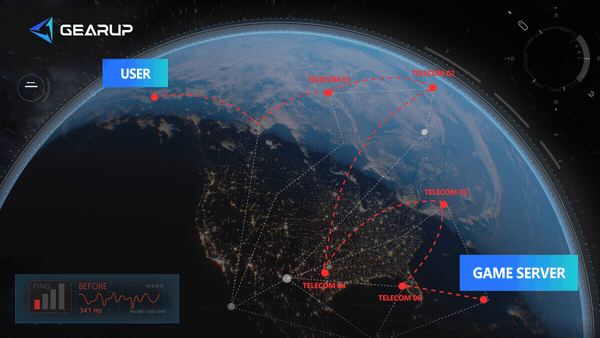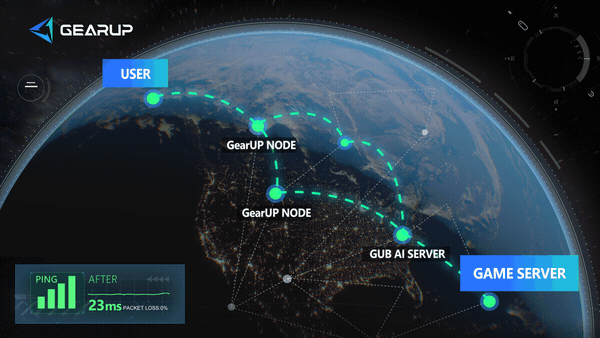Why GearUP Works Better Than VPNs for Online Gaming
Today, online multiplayer or cooperative games have gradually become mainstream. Game developers value the higher revenue brought by player communities, while players focus on the fun of multiplayer connectivity. However, this has also led to new issues surfacing—despite the continuous advancement of network technology and infrastructure upgrades, problems such as latency, high ping, packet loss, disconnections, and even the need for some players to connect to servers in other regions still inevitably arise in the face of massive player bases.
Many people immediately think of VPNs—indeed, it is a tool that has been tested for years. However, its original purpose was to protect privacy and security, so it may not necessarily be effective in addressing complex network issues. This is why game accelerators (GearUP) emerged, specifically designed for optimizing gaming networks. In this article, we will explore in detail the differences between GearUP and traditional VPNs, as well as why it is better suited for online gaming.
What You Need to Know About Data Transmission
Before diving into the details, let’s briefly cover the basics of data transmission. In most cases, due to distance constraints, data doesn’t travel directly from your device (e.g., a PC) to the destination server. Instead, it passes through multiple relay stations, which we call network nodes—much like the roadside motels you encounter on a long-distance road trip. This happens not only because a direct route would be extremely costly but also because geographic limitations often make direct connections impossible.
However, players have no control over which network nodes are connected or how the routing path is built—this is entirely determined by your ISP (Internet Service Provider). Due to cost considerations, ISPs often do not select the optimal nodes, which is why, under different circumstances, we may need to use a VPN or a game accelerator to optimize the connection.


What is a VPN and Why It Can't Effectively Reduce Game Lag?
A VPN (Virtual Private Network) is a service that encrypts your internet traffic and routes it through a remote server, masking your real IP address. It was originally designed to enhance privacy, security, and bypass geo-restrictions (e.g., accessing blocked websites).
Why VPNs Aren’t Great for Reducing Game Lag:
- Encryption Overhead – VPNs add encryption layers, which can increase latency instead of reducing it.
- Indirect Routing – Traffic often takes longer paths to the VPN server, worsening ping rather than optimizing it.
- No Game-Specific Optimization – VPNs treat all traffic equally, unlike tools like GearUP Booster that prioritize game data and use smart routing.
- IP Changes Risk Bans – Some games flag VPN IPs as suspicious, triggering anti-cheat systems or login blocks.
How GearUP Works Differently?
GearUP is a network accelerator specifically designed for gaming. In simple terms, its function is to establish the optimal route to game servers for you, with multiple backup routes available. These routes are dedicated solely to resolving latency and stability issues in game connections, ensuring the best possible performance. Additionally, GearUP can independently handle game traffic, meaning it won’t interfere with the network connections of other applications while also fully safeguarding data security.
You can quickly understand the differences between GearUP and traditional VPNs through the following table:
| Feature | GearUP | Traditional VPN |
|---|---|---|
| Routing Focus | Targets only game traffic, leaves other apps untouched | Routes all internet traffic, including non-gaming apps |
| Adaptive Path Switching | Yes – switches nodes dynamically when packet loss is detected | No – fixed route unless manually changed |
| Server Coverage | 7500+ nodes in 180+ regions, gaming-optimized routes | Varies, often <100 nodes, not game-focused |
| Game Compatibility | Supports 2500+ games with dedicated game handling and updates | No specific optimization for games |
| System Resource Usage | Lightweight, doesn't impact CPU/RAM | Can slow down systems due to full-tunnel encryption |
| Ping Reduction | Yes – intelligent routing with anti-packet loss and real-time ping testing | Sometimes – but not consistent |
| Ease of Use | Click to boost, no config or manual selection needed | Requires VPN setup, manual server selection |
| Security Use Case | Not designed for anonymity or browsing protection | Yes – good for online anonymity, browsing security |
What Else Can GearUP Do?
Of course, in addition to the aforementioned advantages, GearUP also offers a variety of gaming-related services designed to provide players with a comprehensive game-enhancing experience:
- Server Switching & Locking – Thanks to its globally distributed nodes, GearUP allows you to stably connect to specific game servers (supported for select games).
- Twitch Drops AFK Farming – No need to watch streams. GearUP automatically farms view time for you—just wait and claim your rewards.
- Secure Boot Detection – With more popular games adopting Secure Boot, GearUP auto-detects requirements and provides step-by-step setup guides.
- Ping Test – Offers real-time ping testing (via web or client) so you can monitor your network latency anytime.
How to Use GearUP?
User-friendliness is one of the reasons why GearUP is beloved by gamers worldwide. Simply select your game and server—no network configuration needed—and GearUP will automatically optimize your connection. Taking Battlefield 6 as an example:
Step One: Click this button to download GearUP.
Step Two: Search for "Battlefield 6".
Step Three: Select your preferred server—GearUP can connect you to any Battlefield 6 server worldwide.
Step Four: Start the boost! You'll see real-time ping and packet loss data, then simply launch the game and enjoy smooth gameplay.
FAQ about GearUP and VPN
Q1: Can’t a VPN improve my ping in games?
Not reliably. While a VPN might occasionally reduce ping for specific routes, it often adds encryption overhead and reroutes all traffic — which can increase latency or trigger issues with game servers.
Q2: How is GearUP different from a VPN?
GearUP focuses solely on gaming traffic. Unlike VPNs, it doesn’t change your IP or encrypt all data, which makes it more stable for matchmaking, anti-cheat systems, and login verification. It optimizes game routes without interfering with your browsing or downloads.
Q3: Does GearUP offer online privacy protection like a VPN?
No. GearUP is a game booster, not a privacy tool. If you’re looking for anonymous browsing or encrypted internet activity, a VPN is better suited — but not for gaming performance. However, GearUP ensures the security of your network data transmission, so you don’t have to worry about privacy leaks while accelerating.
Q4: Is GearUP compatible with all games and platforms?
GearUP supports over 2,500 PC, mobile and console games, including FPS, MOBA, and MMORPG titles. It also works on all platforms.
Q5: Do I need technical skills to use GearUP?
Not at all. GearUP is designed for gamers of all levels — simply launch the app, choose your game, and click “Boost.” There’s no manual server selection or configuration needed.
Q6: Should I use a VPN or GearUP if I want to change my connected server region?
Both options can help you switch server regions, but VPNs may carry the risk of being banned and cannot reduce latency. GearUP, on the other hand, not only changes the server but also locks it, ensuring you don’t bounce between multiple servers.
Conclusion
In summary, GearUP and VPNs serve different user needs and scenarios—neither is inherently superior.
But for gamers, whether tackling latency, high ping, cross-region play, or server switching, GearUP is clearly the better choice. Its game-tailored features don’t just meet basic acceleration needs; they deliver multiple performance boosts, giving you true gaming freedom.
About The Author
The End
